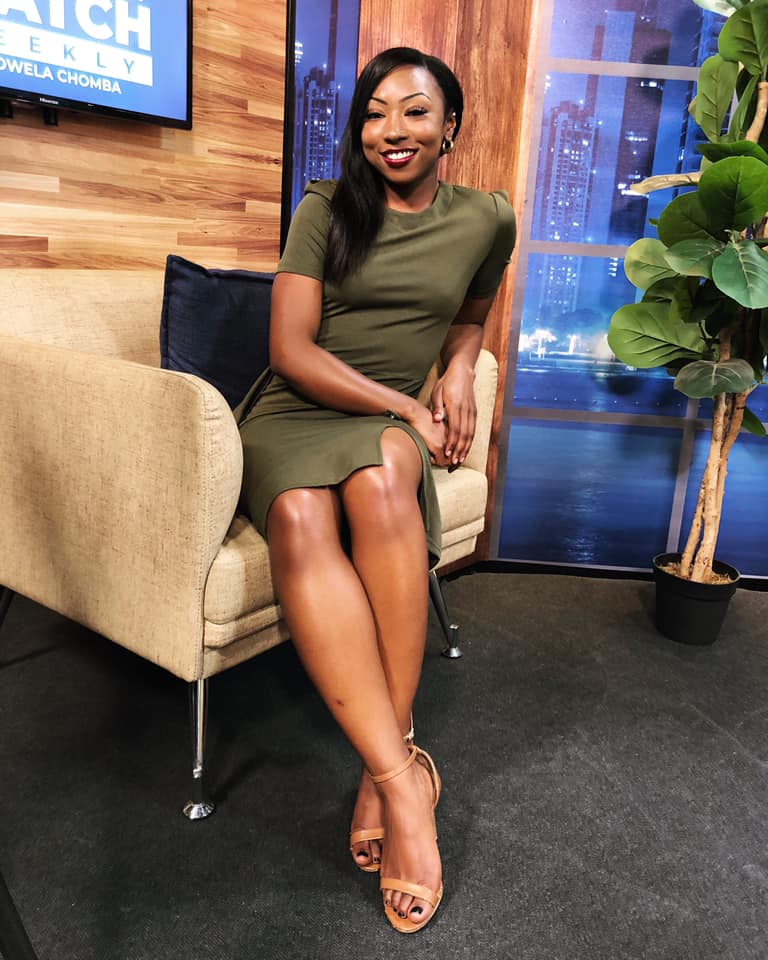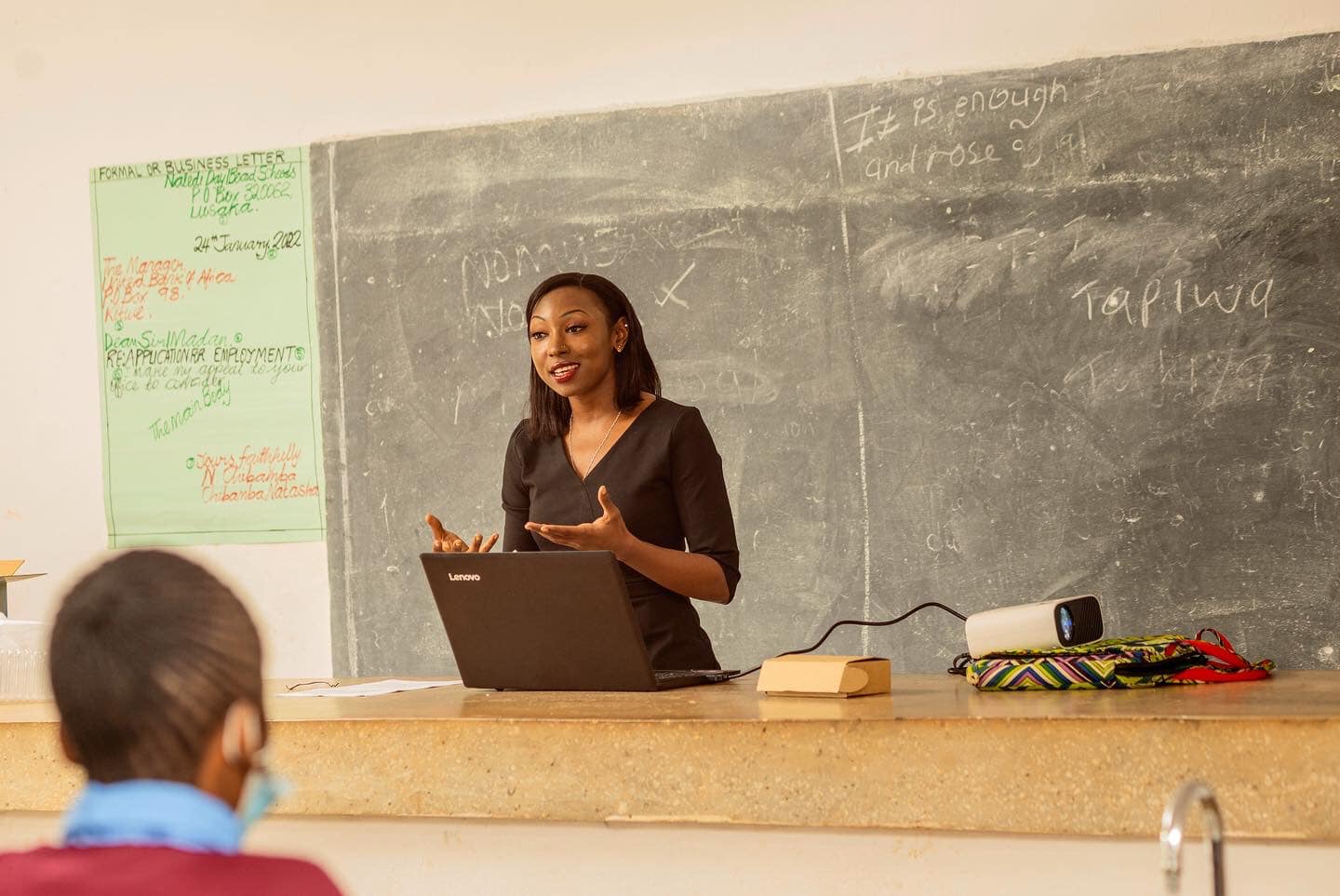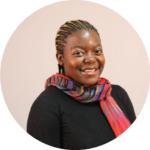Each week, frayintermedia highlights a journalist doing good work on the continent and honours them as our #FaveOfTheWeek. Meet Zambian broadcast journalist Amina Kaunda who is passionate about telling Zambia’s untold stories.

Q: How did you become a journalist?
A: So I actually fell into journalism. It was not the complete plan. I went to Wits University in Johannesburg, where I studied media studies and psychology. With that combination of majors, it’s not likely to say you are specifically training to become a journalist.
Over time, I realised that it was very difficult to find a job. I thought that maybe coming back to my home country might make it easier to find employment. At first, I worked in a number of radio stations. I then realised that I enjoyed reading news. That interest progressed and I was eventually given an opportunity to anchor news.
While anchoring, I started contributing to news stories and I began to start researching and actually carrying out my own interviews. I started speaking to some very prominent people about some very deep-seated issues within Zambia and Africa. I got to speak to the director of the Information and External Relations Division of the World Trade Organisation, Keith Rockwell during Trump’s tenure of presidency. Rockwell tried to block the new World Trade Organisation director from ascending to that position. That was quite a big interview.
Another interview which I hold dear was with the former Afghanistan Woman’s Affairs Minister, Hasin Safi. She fled the country after the Taliban obviously took over. I’ve had a number of interviews that I think I’ve genuinely enjoyed and cherished.
Q: What stories are close to your heart?
A: Of the stories I have done, I would say the story that is closest to my heart would be the miseducation of young women in Zambia. So the pass rate for young women is lower than it is for young men. And that’s almost as if anticipating that women are incapable of achieving the same thing as young men, or that young girls are incapable of achieving the same marks or doing better than young boys.
So that indoctrination of being lesser than already starts from school. It’s a conversation that has come up slowly in the education ministries and in the education system in Zambia and with the new government. They have had discussions about changing it, but that was mentioned possibly, I think, just after the elections, and then it just went quiet. So this is something that I will be chasing again because I think it’s a conversation that needs to be highlighted starting there.

Zambia is an extremely conservative society. They tend to brush a lot of things under the carpet. We are having conversations about gender-based violence but we are not having conversations about how to talk to young women about protecting themselves.
When I have conducted interviews in government hospitals and spoken with young women, the part of the conversation where I ask: “Okay, but why don’t you leave?” is answered by these women saying: “Even if I leave, where do I go? Even if I leave, what do I do?” This is something that they have probably seen, something that they probably witnessed growing up in other homes.
At a grassroots level, it’s so deeply ingrained in some of those societies that it’s difficult to escape. So of all the stories, I think I have conducted, it would be the empowerment of young women and how we are going to actually fix this identity crisis that we have when it comes to young girls and helping and ensuring that they are adequately protected as they grow.
Q: Why are women’s narratives important as well as amplifying them?
A: Women’s narratives are important because we are historically disadvantaged. What this means is that for years, for decades, I think even for centuries, we could say our voices have been muffled and they have been annexed from various conversations. So it is necessary to amplify them because at times I think we fit them in, but we don’t always acknowledge what the message is of what various women’s organisations or various women’s platforms or even various female journalists are trying to say.
We like to say inclusivity, and it’s almost like it exists in name. We like to say that we are trying to create a gender parallel world, but are we really implementing a lot of these plans and actions that we speak of? It sometimes feels like it is just a political strategy for organisations and the political party heads that have the power to make these changes but don’t. So it is necessary to amplify them, especially in the media.
It’s also about empowering women. I get messages from young women quite often who are disadvantaged, whether it’s because of their societal position, whether it’s because of finances. There are a number of things but I feel like we always need to start at the grassroots, and it starts with educating these young girls and letting them know that there are other options as opposed to getting married and having children and starting a family because that’s also disheartening.
It’s something that I see in my country which is limiting young women and girls in their ways of thinking about what they can achieve in life. This is why it’s very important to amplify the voices of women, especially amplifying the voices of powerful women so that they can then reach down and uplift other women who may be struggling.
Q: You are the first Zambian journalist to have been shortlisted for the 2022 BBC Komla Dumor Award, what does this mean for you?
A: I think it’s putting Zambia on the map. My country is a very, very small country. We’re still developing the colloquial term that a lot of people use is, Zambia is ten years behind with everything, every development that happens.
So this for me was a moment to think, well, if one of us makes it between John and myself, if one of us makes it, how incredible would that be that Zambia would somehow be not just regionally but internationally recognized, you know, because it’s not just a win as an individual, but a win for the country. It also proves that Zambian journalists are actually doing what many people think they’re not doing.
Because realistically speaking, it’s just a simple scroll through Twitter, where I do know that Zambian journalists get criticised quite often. It may be a historical institution that analysed habits of the way journalism has been carried on over the years, but that would actually prove that Zambian journalism has taken on the changes that were necessary. Zambian journalism has actually updated its tenacity in terms of how to grow and how to chase stories. This also means that Zambian journalists are worthy of being on an international platform. So what it means to me is just pride in my nation and pride in the work that we are doing.
Q: Despite the challenges, why do I stay in the profession?
A: I stay because I feel like there is so much that needs to be unpacked, especially when it comes to African media and African journalism. It’s sad to say that our industry’s growth has been hampered. We had a fantastic head start and then somewhere along the line or somewhere along the way, we just stopped attacking certain issues and we kind of just started putting things to bed.
I’ve noticed that in Zambia, when it comes to journalistic tenacity, we are a tad lazy. It’s very easy to just call up a politician because he’s your buddy and then just get him to have a statement on a particular issue, then that makes the mainstream news headlines. The journalist has made no effort to go out into the field and has made no effort to go and really grasp any sort of details of an issue. It’s just a back and forth of he said or he said, she said in politics. And that is what colours our media landscape.
As much as, yes, politics does dominate in every country around the world. It just doesn’t need to dominate in the way that it is being portrayed here. There are ways that we can actually get around certain stories that don’t have to do with a comment of a politician, and then that gets splashed on the front page.
I stay in this profession because I feel like there are so many things that nobody is touching on, that nobody is unpacking that really need to be brought to attention. For instance, I did a brief documentary interviewing Christoper Mtonga who is the Lusaka City Council public health director and still won’t answer my questions about the state of the Lusaka cemeteries. These are overrun, and overpopulated graves are being buried far too close together. But for the majority of citizens, that’s the only space where they can bury their dead because that’s the only affordable space available. Private cemeteries are not affordable for the majority of citizens, but those so far are the only organised ones.
So there are things that I think we need to dig into, certain government institutions and certain government individuals that need to be held accountable, that need to be put to task, that need to be placed on certain platforms within the media to answer the questions that nobody else somewhat has the authority to ask. The media is essentially the fourth arm of the state.
I feel like in my own way, I may not be remembered when I’m dead and buried, except for the members of my own family. But I have left some sort of mark on this planet that would have helped change or shape society in some way, even if it’s the small imprint that maybe changed the mindset of someone or inspired someone.

